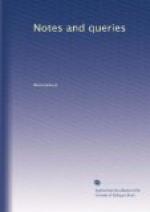D. ROCK.
Buckland, Faringdon.
* * * * *
DR. SAMUEL OGDEN.
In reply to your correspondent TWYFORD (Vol. ii., p. 73.), the original of the common surname Ogden is doubtless Oakden. A place so called is situated in Butterworth, Lancashire, and gave name to a family,—possibly extinct in the sixteenth century. A clergymam, whose name partook both of the original and its corruption, was vicar of Bradford, 1556, viz Dus Tho. Okden. The arms and crest borne by the Oakdens were both allusive to the name, certainly without any reference to King Charles’s hiding-place.
Dr. Samuel Ogden, born in 1716 at Winchester, was the son of Thomas Ogden, a man of very humble origin: but he had the merit of giving a liberal education to one whose natural talents well deserved culture; and both his parents, in the decline of life, owed their support to Ogden’s filial piety and affection. Cole is quite mistaken in fixing the father’s residence at Mansfield, and in stating that he had been in the army. The monument, spoken of by Cole, is not at Mansfield, but in the cathedral of Manchester: nor is it a memorial of Dr. Ogden. It was placed by him in memory of his father. Ogden was buried in his own church, St. Sephlchre’s, Cambridge.
The following epigram, it is believed, has not been printed. It is transcribed from a letter in my possession, addressed by the first Lord Alvanley, when at college, to his former tutor, Mr. Thyer, editor of Butler’s Remains:—
“When Ogden his prosaic verse
In Latin numbers drest,
The Roman language prov’d too weak
To stand the Critic’s
test.
“To English Rhyme he next essay’d,
To show he’d some pretence;
But ah! Rhyme only would not do—
They still expected Sense.
“Enrag’d, the Doctor said
he’d place
In Critics no reliance,
So wrapt his thoughts in Arabic,
And bad them all defiance.”
J.H. MARKLAND.
* * * * * {106}
Ogden Family (Vol. ii., p. 73.).—Perhaps the representatives of the late Thomas Ogden, Esq., and who was a private banker at Salisbury previous to 1810 (presuming he was a member of the family mentioned by your correspondent TWYFORD), might be able to furnish him with the information he seeks.
J.R. FOX.
* * * * *
Replies to Minor Queries.
Porson’s Imposition (Vol. i., p. 71.) is indeed, I believe, an imposition. The last line quoted (and I suppose all the rest) can hardly be Porson’s, for Mr. Langton amused Johnson, Boswell, and a dinner party at General Oglethorpe’s, on the 14th of April, 1778, with some macaronic Greek “by Joshua Barnes, in which are to be found such comical Anglo-hellenisms as [Greek: klubboisin ebagchthae] they were banged with clubs.” Boswell’s Johnson, last ed. p. 591.




